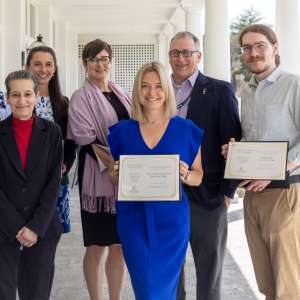Confronting Evil: Dr. Waller’s New Book on Genocide Prevention

As many as 170 million civilians across the world were victims of genocide and mass atrocity in the 20th century. And as much as political leaders stand up and declare, “Never again!” citizens in many countries still find themselves and their families under brutal attack. Look at such places as South Sudan, Burma, Syria, the Central African Republic, Burundi, Iraq, and territory under ISIS control.
Determined to offer real solutions to this horrible problem, Keene State’s Cohen Professor of Holocaust and Genocide Studies Dr. Jim Waller has just published his fifth book, Confronting Evil: Engaging Our Responsibility to Prevent Genocide (released on May 24 by Oxford University Press).
Drawing on over two decades of primary research and scholarship from a wide range of disciplinary perspectives, Confronting Evil: Engaging Our Responsibility to Prevent Genocide is grounded in the belief that preventing mass atrocity is an achievable goal, but only if we have the collective will to do so.
“When people talk about genocide prevention, they tend to compartmentalize it as military intervention,” Dr. Waller explained. “In that line of thinking, genocide prevention means that if we have boots on the ground, it will stop people from killing other people. I wanted to say that genocide prevention is all through the conflict cycle. Before the conflict breaks out, we should be focusing on how we prevent genocide through such things as good governance, a resilient economy, and social cohesion. During genocide, there are lots of ways to keep it from getting worse. I discuss about 20 different tools—sanctions, diplomatic engagement, disengagement—that we have that can make a difference long before it should come to military intervention. There’s also a third phase: When genocide is over, we want to prevent it from happening again, so how do we rebuild societies in the aftermath of this violence? I wanted to conceptualize prevention at all phases of the conflict cycle rather than just waiting until the killing has started. With that in mind, I also wanted to be clear about the reality that early prevention is always the most effective, and least costly, means of building a resilient society and protecting civilians within that society.”
Drawing on an impressively wide and diverse collection of historical and social scientific research, Waller has produced the most comprehensive study of the prevention of genocide yet written. This book will be required reading for all those who seek to understand and avert these atrocities in the future.
Dr. Waller offers concrete and proven steps that world leaders can take to stem a horrific and daunting problem. “The point of the book is to remind us that genocide prevention can occur at all phases of the conflict cycle — before, during, and after crisis,” he said. And he’s already in discussion with Oxford University Press about his next book, Legacies of Evil: Rebuilding Societies After Mass Atrocity.





